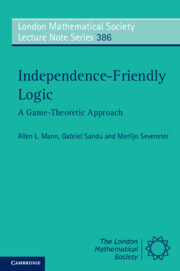5 - Properties of IF logic
Published online by Cambridge University Press: 01 June 2011
Summary
Many basic properties of IF logic were observed by Hodges while he was developing trump semantics [32, 33]. Subsequently, Caicedo and Krynicki attempted to prove a prenex normal form theorem for IF logic [10], but they failed to properly account for the subtleties of signaling. Later Caicedo, Dechesne, and Janssen succeeded in proving many logical equivalences for IF logic, including a prenex normal form theorem [9]. Additional equivalences and entailments first appeared in [39] and were later published in [40]. Basic model-theoretic properties of IF logic have been investigated in [24, 49–51].
Basic properties
A team of assignments encodes a player's knowledge about the current assignment. When we write, ℕ, X ⊧+ ϕ we are asserting that Eloise has a winning strategy for the semantic game for ϕ as long as she knows the initial assignment belongs to X. Now imagine that, at the beginning of the game, an oracle informs Eloise that the initial assignment belongs to a subteam Y ⊂ X. Then Eloise gains an advantage because she has fewer possibilities to consider. Thus smaller teams represent more information about the current assignment. At the extremes, a singleton team represents having perfect information about the current assignment, while the team of all possible assignments with a given domain represents having no information about the current assignment.
The following propositions record two important properties of assignment teams: (1) every subteam of a winning team of assignments is winning, and every subteam of a losing team of assignments is losing; (2) the empty team of assignments is both winning and losing for every IF formula, and it is the only team of assignments that can be both winning and losing for the same formula.
- Type
- Chapter
- Information
- Independence-Friendly LogicA Game-Theoretic Approach, pp. 87 - 133Publisher: Cambridge University PressPrint publication year: 2011

